The role of a VP of Operations is central to the efficiency and effectiveness of any organization. They ensure that all operational aspects run smoothly and align with the company’s strategic goals.
Key skills for a VP of Operations include leadership, strategic planning, and process optimization, along with strong communication and problem-solving abilities.
Candidates can write these abilities in their resumes, but you can’t verify them without on-the-job VP Operations skill tests.
In this post, we will explore 8 essential VP Operations skills, 10 secondary skills and how to assess them so you can make informed hiring decisions.
Table of contents
8 fundamental VP Operations skills and traits
The best skills for VP Operationss include Strategic Planning, Process Optimization, Budget Management, Team Leadership, Risk Management, Supply Chain Management, Data Analysis and Quality Control.
Let’s dive into the details by examining the 8 essential skills of a VP Operations.
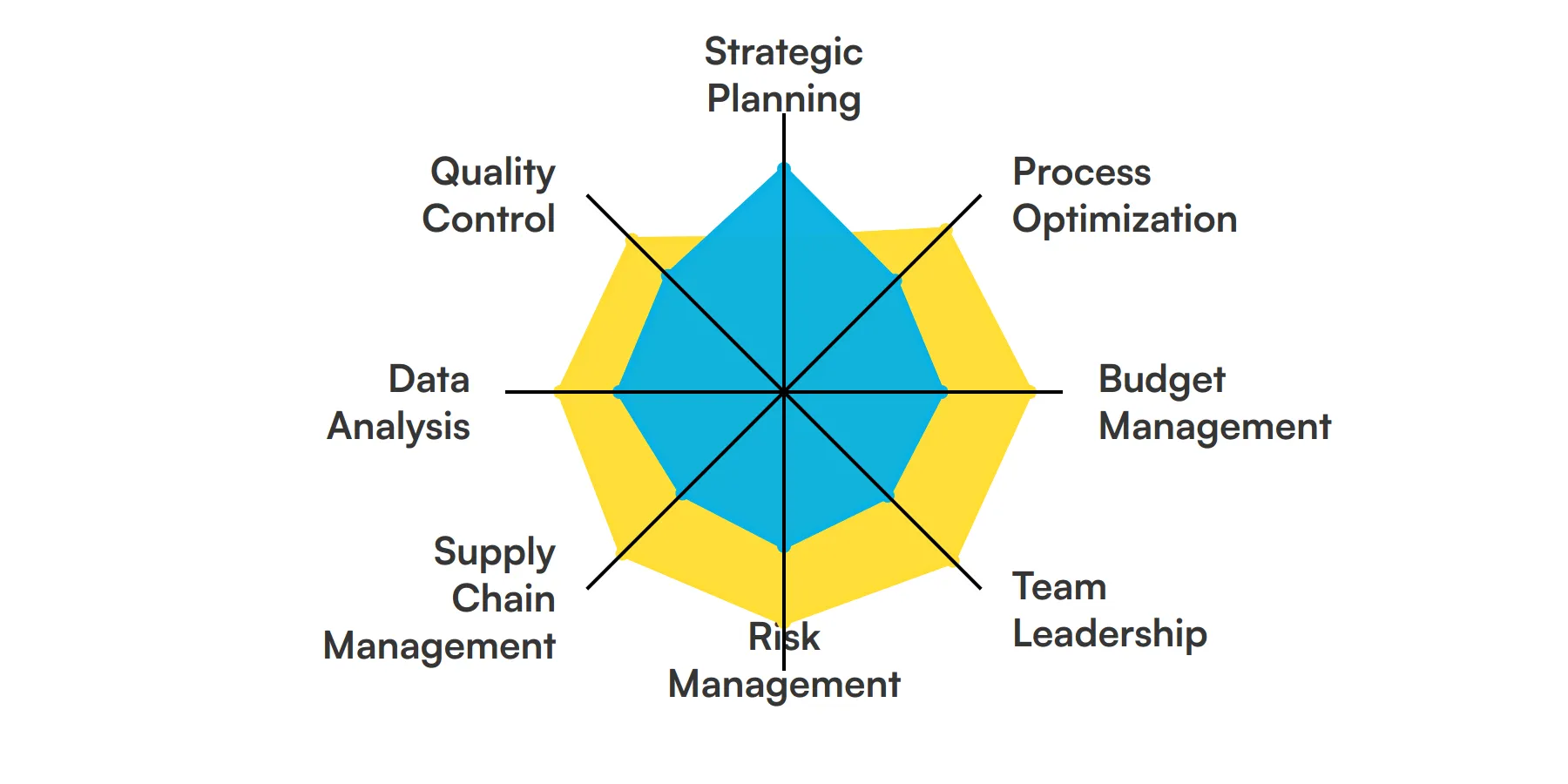
Strategic Planning
Strategic planning involves the VP Operations setting long-term goals and defining the tactics to achieve them. This skill is crucial for aligning the operational activities with the overall business objectives, ensuring that every department contributes effectively towards common goals.
Process Optimization
The VP Operations must excel in process optimization to enhance efficiency across the company. This involves analyzing existing processes, identifying bottlenecks, and implementing improvements to reduce costs, increase speed, and improve quality.
For more insights, check out our guide to writing a Business Operations Manager Job Description.
Budget Management
Effective budget management ensures that the VP Operations can allocate resources wisely to maximize productivity and profitability. This skill is about balancing cost with outcomes, making strategic cuts, and investing in areas that promise the highest returns.
Team Leadership
Leading teams is a daily task for a VP Operations. This skill is about motivating staff, managing team dynamics, and driving the collective towards achieving business goals. It also involves talent development and conflict resolution.
Risk Management
Risk management is essential for a VP Operations to foresee potential problems and implement preventive measures. This skill helps in maintaining continuity of operations and safeguarding the company’s assets and reputation.
Supply Chain Management
The VP Operations needs to manage and optimize the supply chain to ensure timely delivery of products and services. This skill involves coordination with suppliers, logistics planning, and inventory control to meet customer demands efficiently.
Data Analysis
Data analysis enables the VP Operations to make informed decisions based on quantitative evidence. This skill involves interpreting complex data sets to identify trends, measure performance, and forecast future needs.
Check out our guide for a comprehensive list of interview questions.
Quality Control
Maintaining high standards of quality is imperative for the VP Operations. This skill ensures that all products and services meet the required specifications and customer expectations, which is crucial for maintaining brand reputation and customer loyalty.
10 secondary VP Operations skills and traits
The best skills for VP Operationss include Project Management, Regulatory Compliance, Stakeholder Communication, Technology Integration, Change Management, Customer Relations, Conflict Resolution, Sustainability Initiatives, Innovation Management and Vendor Negotiation.
Let’s dive into the details by examining the 10 secondary skills of a VP Operations.
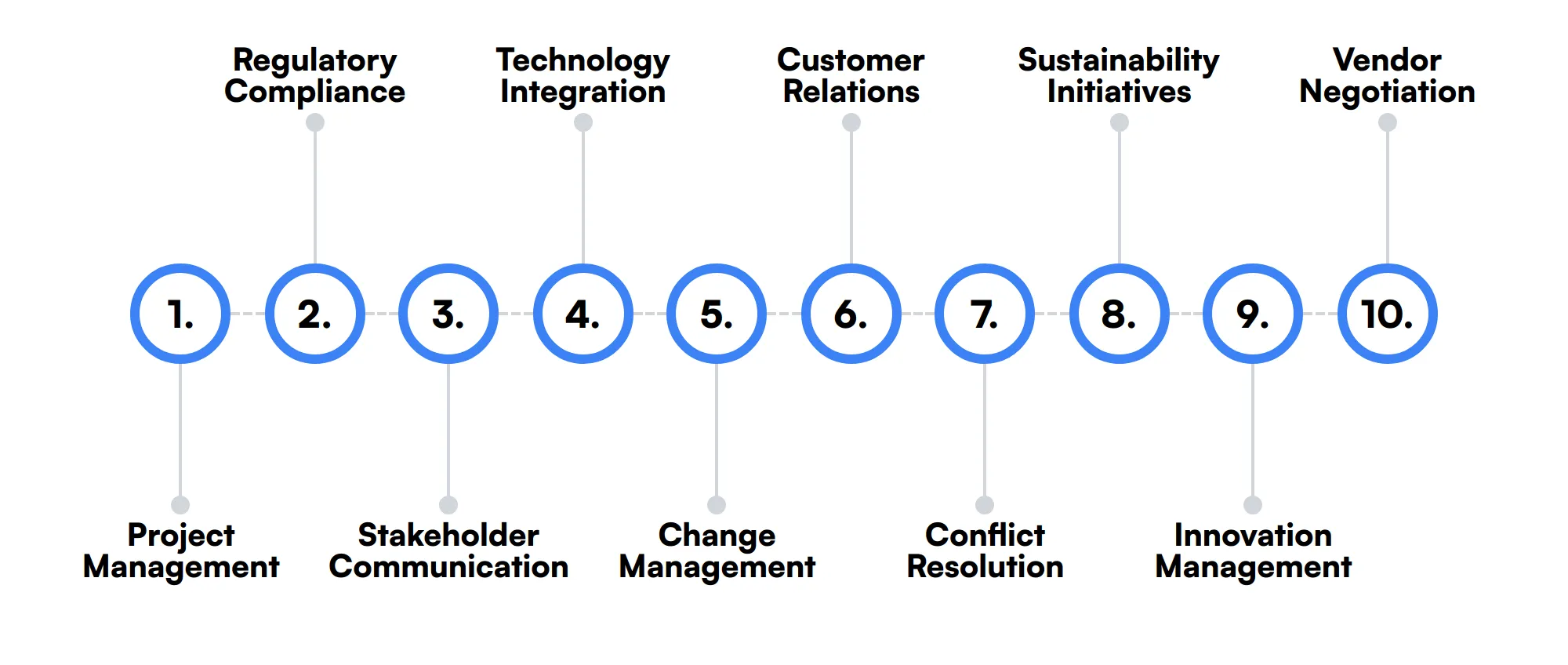
Project Management
Project management involves planning, executing, and finalizing projects according to strict deadlines and within budget. This includes acquiring resources and coordinating the efforts of team members and third-party contractors or consultants.
Regulatory Compliance
Ensuring that all operations comply with relevant laws and regulations is key to avoiding legal issues and fines. This skill is about staying updated with the regulatory environment and implementing necessary compliance measures.
Stakeholder Communication
Effective communication with stakeholders is necessary to keep them informed and engaged with the company’s operations. This skill involves clear, concise, and frequent interactions to ensure alignment and address any concerns promptly.
Technology Integration
Integrating new technologies can lead to significant improvements in operational efficiency. This skill involves identifying, evaluating, and implementing technological solutions that align with business goals.
Change Management
Change management is about guiding and transitioning individuals, teams, and organizations to a desired future state. This skill is crucial when implementing new processes, technologies, or directions within the company.
Customer Relations
Managing customer relations is about ensuring customer satisfaction and loyalty. This skill involves addressing customer issues, gathering feedback, and using this information to improve products and services.
Conflict Resolution
Conflict resolution involves addressing disputes within the team or with external parties effectively. This skill is crucial for maintaining a harmonious work environment and ensuring collaborative efforts are not hindered.
Sustainability Initiatives
Implementing sustainability initiatives can help reduce the environmental impact of operations. This skill involves developing strategies that promote environmental stewardship while also considering economic and social factors.
Innovation Management
Fostering innovation within the operations can lead to significant competitive advantages. This skill involves encouraging creative thinking, experimenting with new ideas, and implementing changes that can improve performance and efficiency.
Vendor Negotiation
Effective vendor negotiation ensures favorable terms and conditions in procurement deals. This skill is about leveraging market knowledge and negotiation tactics to reduce costs and improve service quality from suppliers.
How to assess VP Operations skills and traits
Assessing the skills and traits of a VP of Operations can be a challenging task, given the broad range of responsibilities they handle. From strategic planning and process optimization to budget management and team leadership, a VP of Operations must excel in various domains to ensure the smooth functioning of an organization.
Traditional resumes and interviews often fall short in providing a comprehensive view of a candidate's capabilities. Skills-based assessments offer a more reliable way to evaluate a candidate's competencies and fit for the role. By focusing on real-world scenarios and practical tasks, these assessments can give you a clearer picture of a candidate's strengths and areas for improvement.
For instance, Adaface on-the-job skill tests can help you assess key skills such as risk management, supply chain management, and data analysis. These tests not only improve the quality of hires by 2x but also reduce screening time by 85%, making your hiring process more efficient and effective.
Let’s look at how to assess VP Operations skills with these 6 talent assessments.
Data Interpretation Assessment Test
Our Data Interpretation Assessment Test evaluates a candidate's ability to analyze complex data, extract meaningful insights, and structure observations from multiple data sources like tables, charts, and graphs.
The test assesses skills in reading data, drawing inferences, interpreting graphs, analyzing charts, and data visualization. Candidates must navigate through various data formats and provide accurate interpretations.
Successful candidates demonstrate proficiency in understanding and visualizing data, making informed decisions based on data analysis, and effectively communicating their findings.
Business Analyst IT Test
Our Business Analyst IT Test uses scenario-based MCQs to evaluate candidates on their understanding of the role of a business analyst in IT projects, including requirements gathering, analysis, and documentation.
The test covers analytical thinking, SQL, business analysis, requirements gathering, data analysis, process improvement, system design, project management, and communication. Candidates are assessed on their ability to create user stories, use cases, process flows, and wireframes.
High-scoring candidates show strong analytical and critical thinking skills, effective communication, and a solid understanding of project management methodologies like Agile, Waterfall, and Scrum.
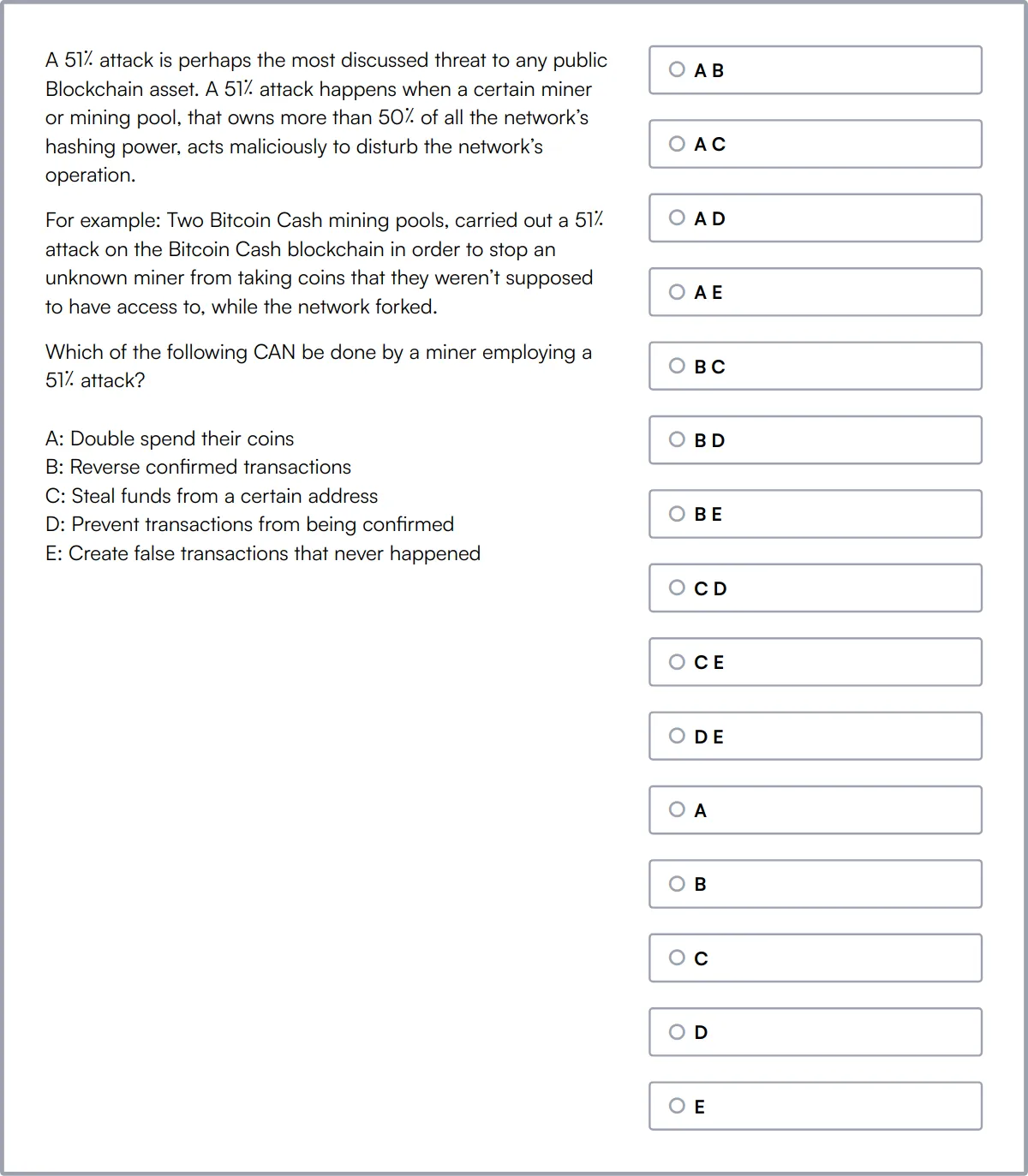
Financial Accounting Online Test
Our Financial Accounting Online Test uses scenario-based multiple-choice questions to evaluate a candidate's knowledge and skills related to financial statements and reporting, accounting principles, and financial analysis.
The test assesses understanding of financial statements, accounting principles, double-entry bookkeeping, assets and liabilities, income and expense recognition, financial ratios, and cash flow statements. Candidates must interpret and analyze financial data and apply accounting standards.
Successful candidates demonstrate proficiency in financial analysis, decision-making, and effective communication of financial information to stakeholders.
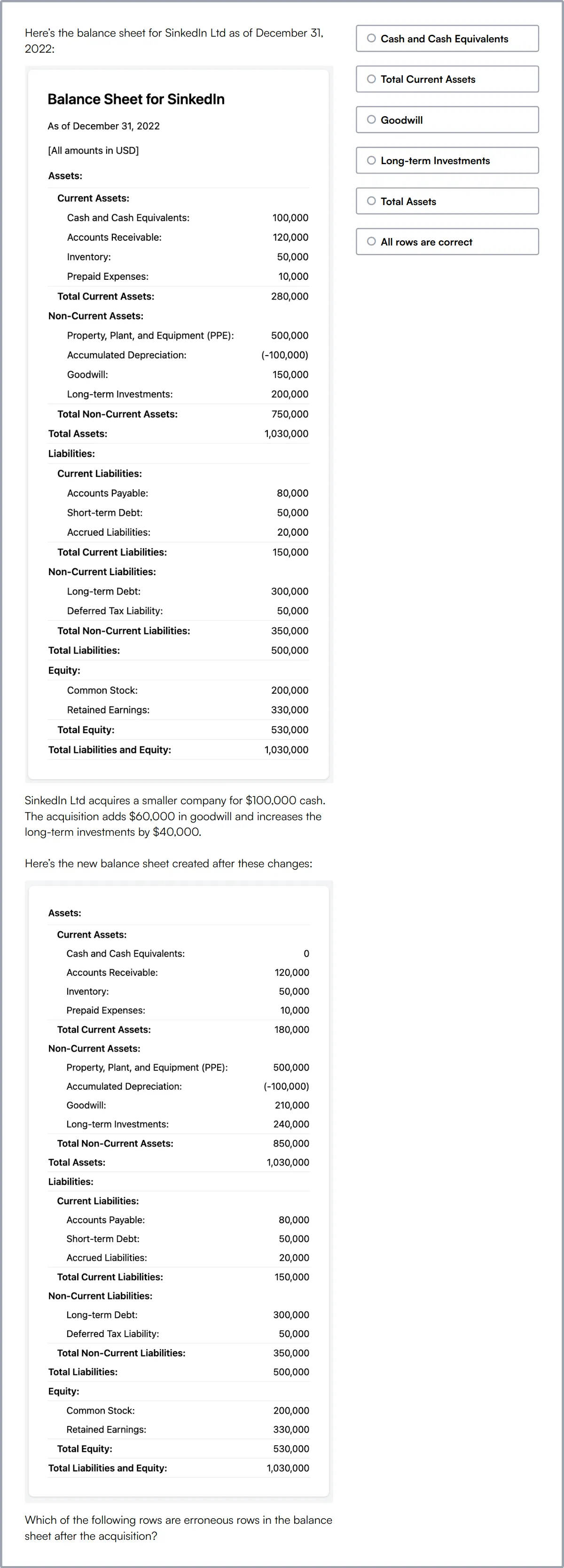
Leadership Psychometric Test
Our Leadership Psychometric Test evaluates candidates on their personality traits and cognitive abilities through scenario-based MCQs, covering the Big 5 personality traits, situational judgment, and logical reasoning.
The test assesses traits like conscientiousness, agreeableness, openness, extraversion-introversion, and neuroticism. It also evaluates emotional intelligence, conflict management, communication skills, decision-making, problem-solving, and time management.
High-scoring candidates exhibit strong leadership qualities, strategic thinking, and the ability to manage and resolve conflicts effectively.
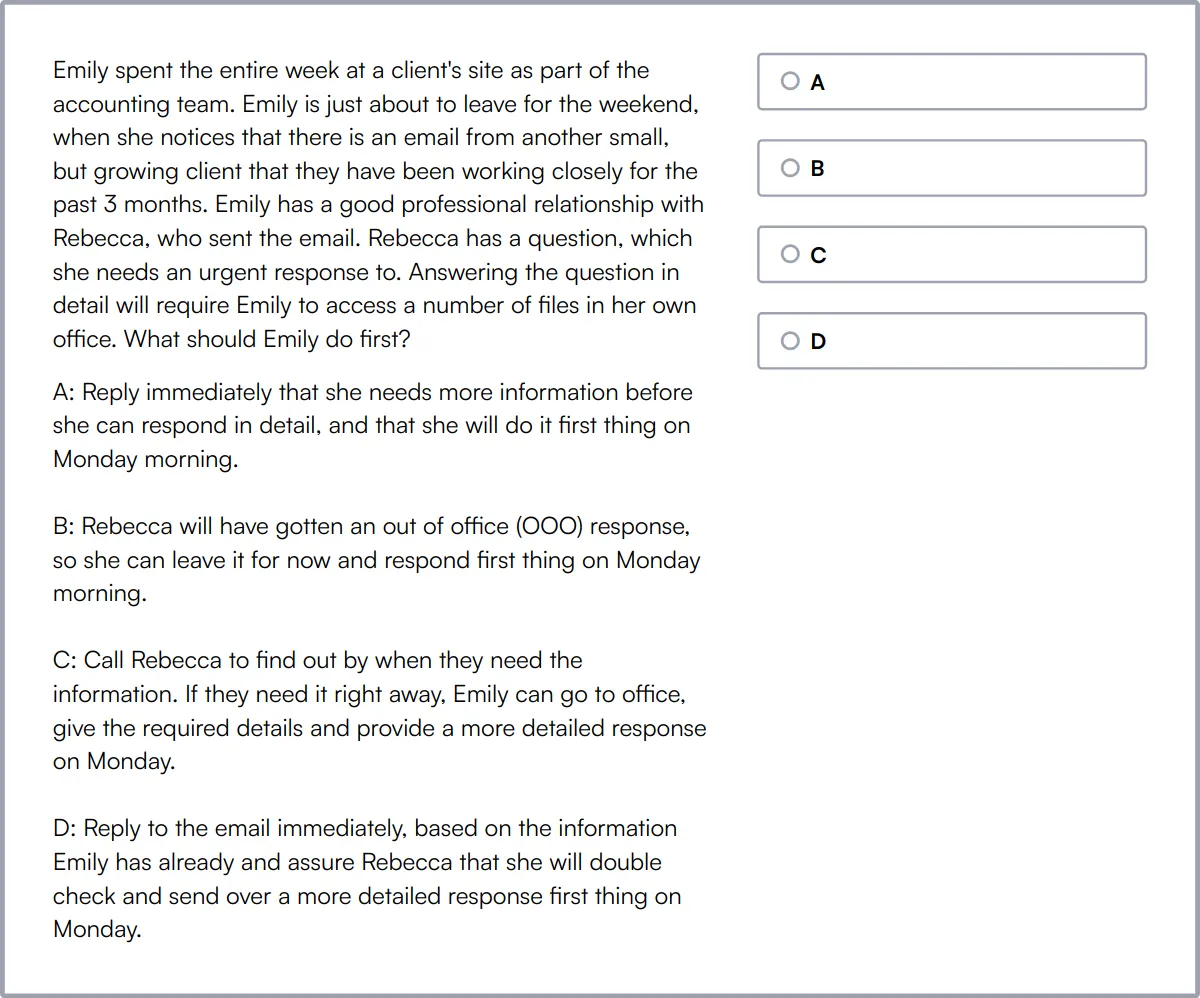
GDPR Online Test
Our GDPR Online Test uses scenario-based MCQs to evaluate candidates on their understanding of GDPR regulations and best practices for data protection and privacy.
The test covers data privacy, data protection, data security, data breach, data processing, consent management, data retention, data subject rights, data transfer, data controllers, and data processors. Candidates must identify and evaluate data protection risks and develop GDPR compliance policies.
Successful candidates demonstrate a thorough understanding of GDPR regulations and the ability to ensure the security and privacy of personal data.
Microsoft Dynamics 365 Supply Chain Management Functional Consultant Test
Our Microsoft Dynamics 365 Supply Chain Management Functional Consultant Test uses scenario-based MCQs to evaluate candidates on their understanding of core functional concepts in supply chain management.
The test assesses knowledge in supply chain planning, inventory management, production control, procurement, demand forecasting, order management, quality control, and transportation management. Candidates must demonstrate their ability to implement and customize Dynamics 365 SCM solutions.
High-scoring candidates show proficiency in managing and optimizing supply chain processes and effectively using Dynamics 365 SCM tools.
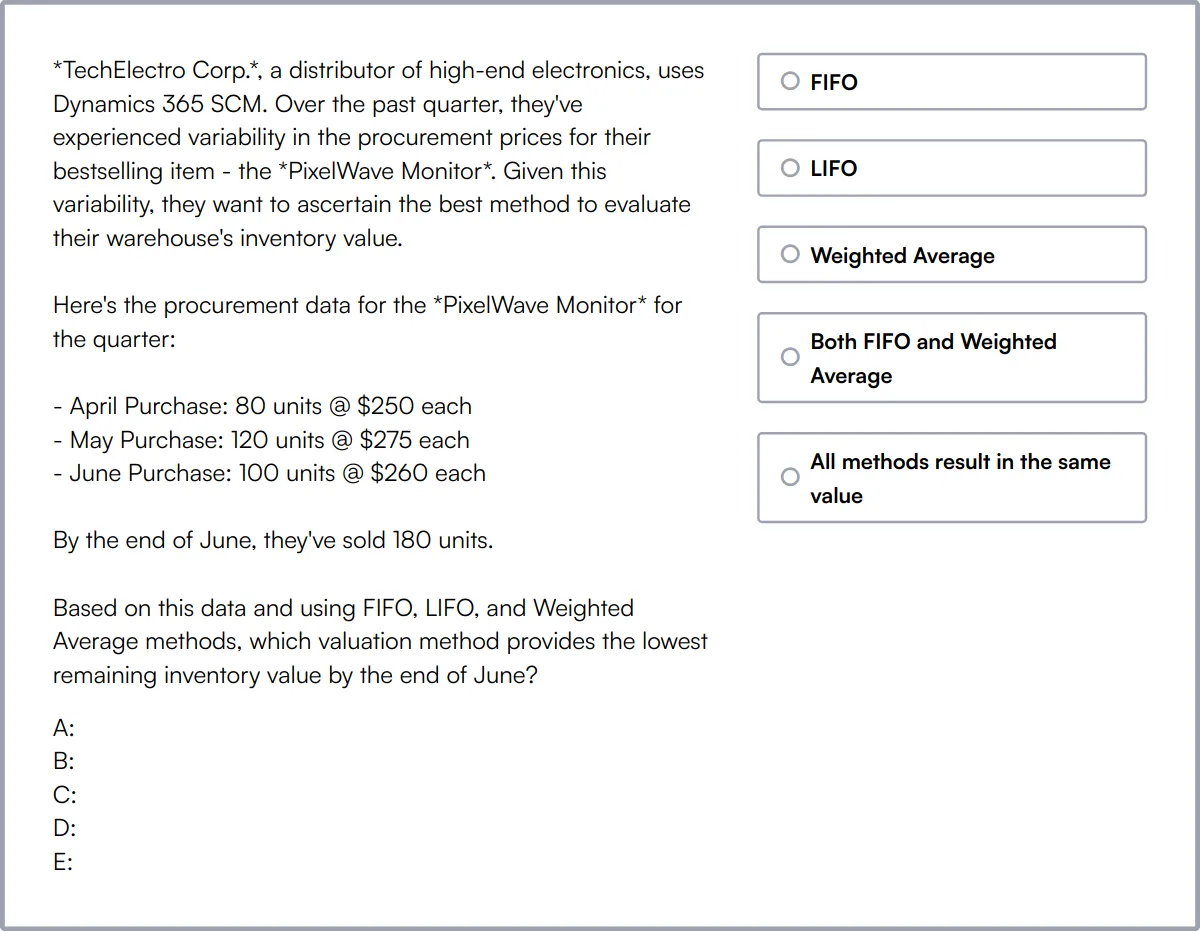
Summary: The 8 key VP Operations skills and how to test for them
| VP Operations skill | How to assess them |
|---|---|
| 1. Strategic Planning | Evaluate ability to develop long-term objectives and actionable strategies. |
| 2. Process Optimization | Assess skills in streamlining operations to enhance productivity and efficiency. |
| 3. Budget Management | Review proficiency in planning, allocating, and controlling financial resources. |
| 4. Team Leadership | Observe leadership style and effectiveness in team development and motivation. |
| 5. Risk Management | Check capability to identify, analyze, and mitigate potential risks. |
| 6. Supply Chain Management | Examine expertise in managing and optimizing end-to-end supply processes. |
| 7. Data Analysis | Test analytical skills through interpretation of complex data sets. |
| 8. Quality Control | Assess commitment to standards through error and defect management. |
Microsoft Dynamics 365 Finance and Operations Apps Developer Test
VP Operations skills FAQs
What are the key skills required for a VP of Operations?
A VP of Operations should excel in strategic planning, process optimization, budget management, team leadership, risk management, and supply chain management.
How can recruiters assess strategic planning skills in a VP of Operations candidate?
Recruiters can assess strategic planning skills by asking candidates to describe past experiences where they developed and implemented long-term business strategies.
What methods can be used to evaluate a candidate's process optimization abilities?
Candidates can be asked to provide examples of how they have improved operational processes, including specific metrics or outcomes achieved.
How important is budget management for a VP of Operations, and how can it be assessed?
Budget management is critical. Assess it by asking candidates to discuss their experience with budget planning, monitoring, and cost-saving initiatives.
What questions can help determine a candidate's team leadership skills?
Ask about their experience in leading diverse teams, handling conflicts, and fostering a collaborative work environment.
How can risk management skills be evaluated during the hiring process?
Evaluate risk management skills by asking candidates to describe how they have identified, assessed, and mitigated risks in previous roles.
What is the best way to assess a candidate's experience with supply chain management?
Inquire about their experience in managing supply chains, including specific challenges faced and solutions implemented.
How can recruiters gauge a candidate's proficiency in data analysis?
Ask candidates to provide examples of how they have used data analysis to drive decision-making and improve operational performance.

40 min skill tests.
No trick questions.
Accurate shortlisting.
We make it easy for you to find the best candidates in your pipeline with a 40 min skills test.
Try for freeRelated posts
Free resources



